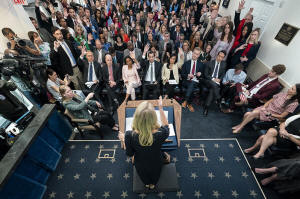The White House is starting a new media policy that restricts wire
services' access to the president
[April 16, 2025]
By DAVID BAUDER
Fresh from a courtroom loss over The Associated Press' access to the
presidency, the White House on Tuesday put forward a new media policy
that sharply curtails access to Donald Trump by news agencies that serve
media outlets around the world. It was the latest attempt by the new
administration to control coverage of its activities.
The move would block the AP and other wire services that serve billions
of readers through thousands of news outlets. It comes after a judge
ruled the White House had violated the organization’s free speech by
banning it because it disagreed with the outlet’s decision not to rename
the Gulf of Mexico.
While outlining a new “pool coverage” policy for small spaces like the
Oval Office and Air Force One, the White House also said it will
ultimately give press secretary Karoline Leavitt the final say over who
gets to question her boss, according to people who have seen the plan.
The White House did not return messages for comment on Tuesday evening.
A federal judge last week ruled the White House improperly punished the
AP for refusing to rename the Gulf of Mexico by blocking its reporters
and photographers from covering the events. U.S. District Judge Trevor
N. McFadden ordered the administration to treat the AP as it does other
news organizations.
Reframing who gets access to the president for questions
A day after defying McFadden's ruling and continuing AP's ban when Trump
and El Salvador President Nayib Bukele met with reporters in the Oval
Office, the White House leaked a new policy to selected journalists.

For many years, the White House Correspondents Association has run the
pool for the limited space events, and each time it has included
reporters from the wire services AP, Reuters and Bloomberg. One print
reporter was also allowed, selected on a rotating basis from more than
30 news outlets.
The White House now says it will lump the three wire services with print
reporters for two slots — meaning roughly three dozen reporters will
rotate for two regular slots. Wire services typically report and write
stories that are used in multiple locations around the country and the
planet.
Even with the rotation, the White House said Trump's press secretary
“shall retain day-to-day discretion to determine composition of the
pool.” The new policy says reporters will also be allowed in
“irrespective of the substantive viewpoint expressed by an outlet.”
In a statement, the AP's Lauren Easton said the outlet was deeply
disappointed that rather than restore the AP's access, the White House
instead chose restrictions over all of the wire services.
“The wire services represent thousands of news organizations across the
U.S. and the world over,” said Easton, an AP spokeswoman. "Our coverage
is used by local newspapers and television stations in all 50 states to
inform their communities.
“The administration's actions continue to disregard the fundamental
American freedom to speak without government control or retaliation,”
Easton said Tuesday night.
The independent White House Correspondents’ Association said the
administration’s insistence on retaining control over who covers the
president shows that it is unwilling to guarantee that it would not
continue “viewpoint discrimination.”

[to top of second column]
|

White House press secretary Karoline Leavitt speaks with reporters
in the James Brady Press Briefing Room at the White House, Tuesday,
April 15, 2025, in Washington. (AP Photo/Alex Brandon)

“The government should not be able to control the independent media
that covers it,” said Eugene Daniels, the association’s president.
More access for Trump-friendly media
Under Leavitt, the White House has given greater access to news
outlets friendly to Trump. That was visible Tuesday, when the first
reporter Leavitt addressed during a briefing asked two questions
while also praising Trump policy.
At Monday's Oval Office meeting, Trump bristled at questions from
CNN's Kaitlan Collins about a man deported to an El Salvador prison,
at one point accusing CNN of “hating our country.” He made it a
point to contrast her questions with a non-pointed one from another
reporter.
Despite the occasional fireworks, Trump has made himself accessible
to the media more than his predecessor, former President Joe Biden.
Cramped-quarters events, particularly in the Oval Office, are some
of his favorite places to talk — rendering the new access policy all
the more impactful.
The new policy advanced on Tuesday did not address access for
photographers. At an earlier court hearing about the AP's case, the
outlet's chief White House photographer, Evan Vucci, and
correspondent Zeke Miller testified about how the ban has hurt the
business of a news agency built to quickly get news and images to
its customers.
The dispute stems from AP’s decision not to follow the president’s
executive order to rename the Gulf of Mexico, although AP style does
cite Trump’s wish that it be called the Gulf of America. McFadden
agreed with AP's argument that the government cannot punish the news
organization for what it says — for exercising its right to free
speech.
The White House has argued that press access to the president is a
privilege, not a right, that it should control — much like it
decides to whom Trump gives one-on-one interviews. In court papers
filed last weekend, his lawyers signaled that even with McFadden's
decision, the AP's days of unchallenged access to open presidential
events were over.

“No other news organization in the United States receives the level
of guaranteed access previously bestowed upon the AP,” the
administration argued. “The AP may have grown accustomed to its
favored status, but the Constitution does not require that such
status endure in perpetuity.”
The administration has appealed McFadden's ruling, and is scheduled
to be in an appeals court on Thursday to argue that ruling should be
put on hold until the merits of the case are fully decided, perhaps
by the U.S. Supreme Court.
The administration has not curtailed AP access to Leavitt's
briefings over the past two months. It has blocked access to events
in the East Room to White House-credentialed AP reporters — until
Tuesday, when one was allowed into an event that involved the Navy
football team.
All contents © copyright 2025 Associated Press. All rights reserved |